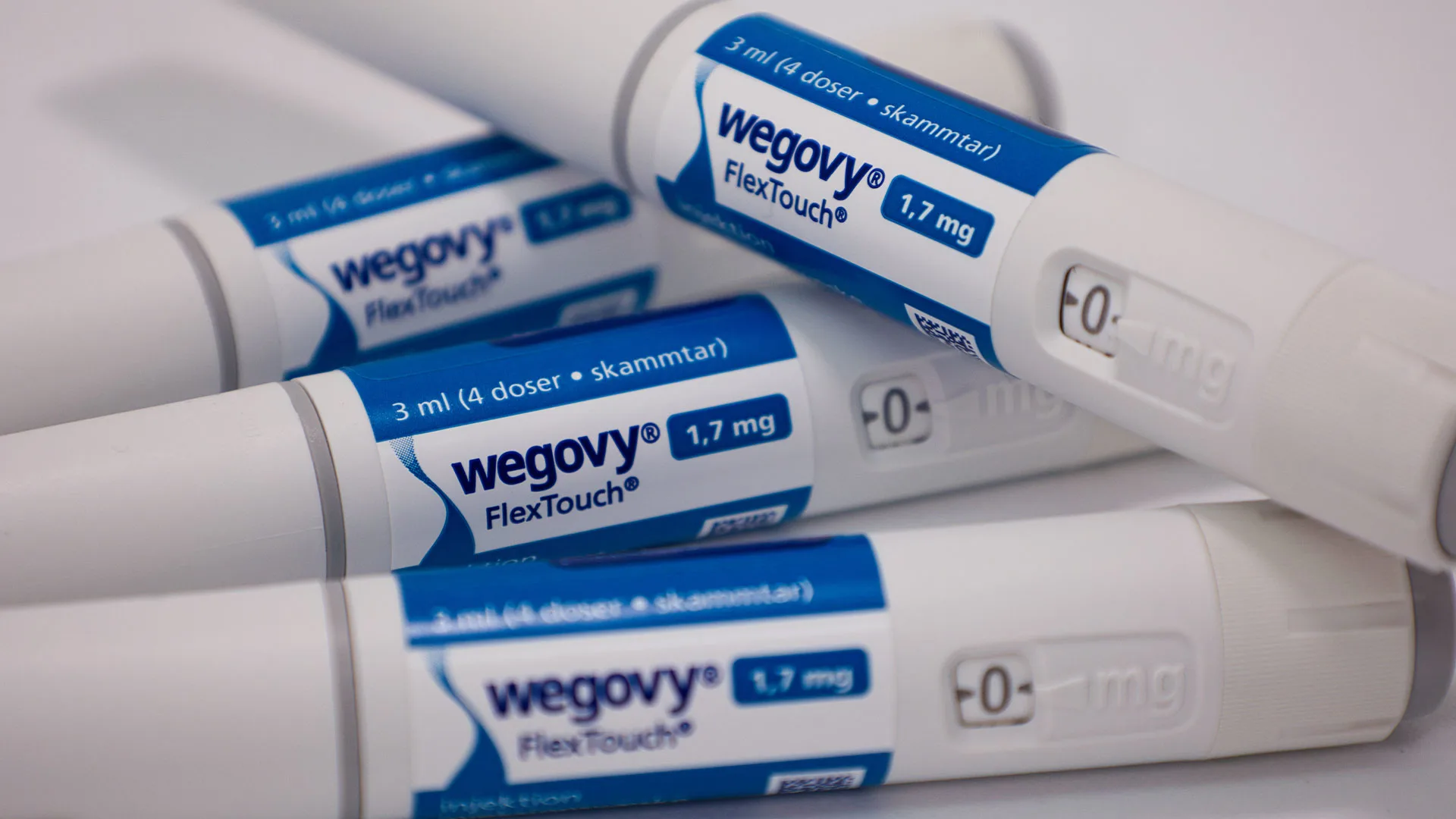The stock market witnessed a dramatic turn of events as shares of Hims & Hers Health, Inc. (NYSE: HIMS) plummeted over 30% in early trading. This significant drop was triggered by an abrupt announcement from Danish pharmaceutical giant Novo Nordisk, which declared the immediate termination of its brief partnership with the telehealth company.
The reason cited for this unexpected breakup revolved around serious concerns regarding Hims & Hers’ continued sale of what Novo Nordisk termed “knock-off” weight loss drugs. This development marks the latest, and perhaps most impactful, update in what has been a rather volatile year for Hims & Hers.
Just this April, Hims & Hers’ stock had experienced a surge. This positive movement was a direct result of the initial announcement of a collaboration with Novo Nordisk. The partnership was poised to allow Hims & Hers to directly offer Wegovy, Novo Nordisk’s FDA-approved and highly sought-after weight loss medication, through its prominent telehealth platform. However, less than two months after this promising alliance was formed, it has fractured.
Novo Nordisk’s decisive action stems from allegations that Hims & Hers engaged in “deceptive promotion and selling of illegitimate, knockoff versions of Wegovy that put patient safety at risk.” This accusation has sent shockwaves through the market, leaving investors scrambling and raising significant questions about the future of Hims & Hers’ weight loss offerings and its regulatory compliance.
The Compounding Controversy: What Led to the Split
The core of the dispute lies in the complex regulatory landscape surrounding compounded medications and Hims & Hers’ approach to their sale.
The Rise of Compounded GLP-1s During Shortages
The story of “knock-off” Wegovy, and indeed many other GLP-1 medications, began in 2022. At that time, the Food and Drug Administration (FDA) officially declared a widespread shortage of these popular drugs, which include both Ozempic and Wegovy.
This declaration had a significant regulatory implication: under federal law, when an FDA-approved drug is in shortage, licensed pharmacies are generally permitted to create compounded versions of the brand-name drugs. These compounded versions are made using the same active ingredient, in this case, semaglutide, and can often be sold at a lower cost, providing an alternative for patients struggling to access the brand-name medications due to supply issues.
Hims & Hers was one of several companies that actively participated in this practice. They began selling a compounded – and crucially, non-FDA-approved – version of Wegovy to their patients. This allowed them to meet the burgeoning demand for weight loss solutions at a time when the official supply was limited. This practice, while permitted under the shortage provisions, operates in a different regulatory sphere than FDA-approved drugs. Compounded medications are not subjected to the same rigorous safety, efficacy, and quality reviews by the FDA as their brand-name counterparts, raising inherent concerns, especially when mass-produced.
FDA’s Shift: Ending the Shortage and Enforcement
A pivotal moment occurred in February of the current year when the FDA officially announced that Ozempic and Wegovy were no longer categorized under a shortage. This declaration fundamentally altered the legal and regulatory landscape for compounded versions of these drugs. With the brand-name medications fully back on the market and supply stabilized, the rationale for allowing widespread compounding diminished.
Consequently, the FDA issued new guidance, providing compounders a grace period of “60 to 90 days to stop making copies of the patented drugs.” This directive was a clear signal that the temporary permissions granted during the shortage were being revoked, and stricter enforcement would resume.
At that time, Hims & Hers acknowledged this regulatory shift in a public regulatory filing. They stated that while they foresaw potential “pathways to continue offering access to certain compounded GLP-1s after the shortage,” they could not “guarantee that we will be able to continue offering these products in the same manner, to the same extent, or at all.”
This statement reflected an awareness of the changing legal environment. However, reports emerged from analysts, including one who spoke to Reuters, suggesting that Hims & Hers appeared to be preparing to “continue selling compounded semaglutide using ‘personalized doses'” even after the official end of the shortage. This perceived intention to circumvent the spirit of the FDA’s new guidance ultimately became a major point of contention with Novo Nordisk.
Novo Nordisk’s Allegations: Breaching Trust and Law
Novo Nordisk’s decision to terminate the partnership stems from its belief that Hims & Hers failed to comply with regulations and engaged in risky practices.
Failure to Transition from Compounded Drugs
The initial partnership announced in April between Hims & Hers and Novo Nordisk was heralded as a “long-term collaboration” aimed at expanding access to FDA-approved Wegovy directly to consumers through the telehealth platform. This alliance was seemingly intended to mark a transition for Hims & Hers, shifting its focus from compounded versions to the authentic, branded medication.
However, less than two months later, Novo Nordisk has severed ties, explicitly stating that Hims & Hers “has not acted fast enough to stop selling its compounded GLP-1.” This indicates a fundamental disagreement on the pace and commitment to ceasing the sale of non-FDA-approved semaglutide.
Novo Nordisk highlighted that while “semaglutide compounding is permitted under US compounding laws only in rare instances,” other telehealth companies with whom they, or Eli Lilly (maker of rival GLP-1s like Zepbound), have engaged in similar collaborations, “have demonstrated a good faith effort to transition patients to authentic, FDA-approved Wegovy.” This comparison suggests that Novo Nordisk perceived Hims & Hers as an outlier, failing to meet the expected standards of compliance and transition. The Danish pharmaceutical giant’s patience evidently ran thin, leading to the dramatic termination of the partnership, signifying a zero-tolerance policy for practices it deems in violation of regulatory guidelines or patient safety.
Accusations of Deceptive Marketing and Safety Risks
Novo Nordisk’s decision was underpinned by strong accusations against Hims & Hers, going beyond mere non-compliance to include allegations of “deceptive promotion and selling of illegitimate, knockoff versions of Wegovy that put patient safety at risk.” In a detailed email to Fast Company, a Novo Nordisk spokesperson elaborated on their concerns. They specifically accused Hims & Hers of a “failure to adhere to the law which prohibits mass sales of compounded drugs under the false guise of ‘personalization’.”
This “personalization,” according to Novo Nordisk, involved offering the same drug but merely in “different doses,” which does not constitute a legitimate medical need for compounding when an approved product is available.
Furthermore, Novo Nordisk expressed “deep concern” about these “knock-off drugs” potentially being “made with foreign illicit active pharmaceutical ingredients.” A press release from Novo Nordisk, published the morning of the stock plummet, directly stated that their investigation found the “semaglutide active pharmaceutical ingredients that are in the knock-off drugs sold by telehealth entities and compounding pharmacies are manufactured by foreign suppliers in China.”
The release further cited a Brookings Institute report, highlighting that the “FDA has never authorized or approved the manufacturing processes used by any of these foreign suppliers to make semaglutide, nor has FDA ever reviewed or authorized the quality of the ‘semaglutide’ they produce.” This directly implies a significant safety and quality control concern. Novo Nordisk concluded that this was “unacceptable,” emphasizing their commitment to patient safety and adherence to legal standards as the primary drivers for ending the collaboration.
Hims & Hers’ Counter-Response and Market Impact
Hims & Hers responded to Novo Nordisk’s claims, while investors reacted swiftly and negatively to the partnership’s termination.
Hims & Hers Defends Its Model
In the immediate aftermath of Novo Nordisk’s announcement, Hims & Hers did not issue a formal press release or comment directly to initial media inquiries regarding Novo Nordisk’s specific claims of illegal compounding or deceptive marketing. However, Andrew Dudum, the CEO of Hims & Hers, took to X (formerly Twitter) to offer a direct response and defend his company’s operational philosophy. Dudum expressed his disappointment, stating, “We are disappointed to see Novo Nordisk management misleading the public.”
He then shifted the narrative, alleging that “In recent weeks, Novo Nordisk’s commercial team increasingly pressured us to control clinical standards and steer patients to Wegovy regardless of whether it was clinically best for patients.” This suggests a conflict over medical autonomy versus pharmaceutical influence. Dudum emphatically stated, “We refuse to be strong-armed by any pharmaceutical company’s anticompetitive demands that infringe on the independent decision making of providers and limit patient choice.”
He reiterated Hims & Hers’ commitment to offering “access to a range of treatments, including Wegovy, to ensure providers can serve the individual needs of patients,” implying that their compounded offerings were part of this broad choice. This response frames the disagreement as a matter of patient choice and provider independence, rather than a regulatory or safety issue.
Immediate and Severe Stock Reaction
The market’s reaction to the termination of the partnership was immediate and severe for Hims & Hers. At the time of reporting, HIMS stock was down a staggering 32.6% since market open, wiping out a significant portion of its market capitalization. This dramatic plunge reflects the profound concern among investors regarding several key factors. Firstly, the loss of a direct partnership with the leading manufacturer of a blockbuster weight loss drug like Wegovy is a significant blow to Hims & Hers’ growth strategy in the highly lucrative obesity management market. The collaboration announced in April had been a major catalyst for the stock’s previous rally, and its abrupt cessation signals a major setback.
Secondly, the accusations of “illegal mass compounding” and “deceptive marketing” carry substantial regulatory and reputational risk. Investors are likely factoring in the potential for increased scrutiny from the FDA, possible legal challenges, and a loss of public trust. The mention of foreign, unapproved active pharmaceutical ingredients further exacerbates these concerns, raising questions about patient safety and product quality within Hims & Hers’ supply chain.
This sudden drop indicates that the market views these risks as substantial and potentially long-lasting, forcing a significant re-evaluation of the company’s business model and future prospects in the highly competitive and heavily regulated pharmaceutical and telehealth sectors.
Broader Implications and Future Outlook
The fallout from this terminated partnership extends beyond just Hims & Hers, impacting the wider telehealth and compounded drug landscape.
Regulatory Scrutiny on Telehealth and Compounding
This high-profile dispute between Novo Nordisk and Hims & Hers intensifies the already growing regulatory scrutiny on telehealth companies and their involvement in dispensing compounded medications. The FDA’s recent actions, including the declaration that GLP-1 medications are no longer in shortage and setting deadlines for compounders to cease making “essentially copies” of branded drugs, underscore a concerted effort to tighten regulations.
The core issue revolves around Section 503A and 503B of the Federal Food, Drug, and Cosmetic Act, which generally prohibit pharmacies from compounding “essential copies” of commercially available, FDA-approved drugs unless a specific exemption, like a drug shortage, applies.
The controversy highlights a perceived loophole or aggressive interpretation by some telehealth companies. While Hims & Hers argued for “personalized doses,” Novo Nordisk, backed by the FDA’s stance, sees this as a guise for mass production and distribution of unapproved drugs.
This situation creates a precedent and will likely lead to increased enforcement actions by the FDA against companies that continue similar practices. Other telehealth platforms like Ro and Noom have also faced criticism from Eli Lilly regarding their continued sale of compounded GLP-1s, indicating a broader industry challenge. The legal and regulatory environment for compounded medications, especially in the context of mass telehealth distribution, is becoming increasingly restrictive, forcing companies to adapt or face significant repercussions.
The Battle for the Weight Loss Market
The escalating conflict between pharmaceutical giants like Novo Nordisk and Eli Lilly, and telehealth providers and compounding pharmacies, reveals the immense financial stakes in the burgeoning weight loss medication market. With blockbuster drugs like Wegovy and Zepbound generating billions in revenue, drug manufacturers are fiercely protective of their patented products. They view compounded versions, often sold at lower prices, as infringing on their intellectual property and potentially endangering patients with untested, unapproved ingredients.
Novo Nordisk’s aggressive stance, including direct public statements and termination of partnerships, is a clear signal of its commitment to controlling the distribution and ensuring the integrity of its FDA-approved products. This situation foreshadows a future where access to these highly demanded medications will be increasingly channeled through official, branded pathways, rather than compounded alternatives. For patients, this could mean less access to cheaper options, but theoretically, greater assurance of product quality and safety.
For telehealth companies, it means a need to pivot their strategies, either by forging compliant partnerships with pharmaceutical companies, developing other non-compounded offerings, or focusing on different areas of care. The “break-up” between Novo Nordisk and Hims & Hers is not just an isolated incident; it’s a significant indicator of the ongoing, high-stakes battle to dominate the lucrative and rapidly evolving weight management industry.
Turning Point for Telehealth
The abrupt termination of the partnership between Novo Nordisk and Hims & Hers Health, Inc. marks a pivotal moment for the telehealth industry, particularly concerning the distribution of high-demand medications like Wegovy. Hims & Hers’ stock plunge reflects deep investor concern over the direct accusations of “illegal mass compounding” and “deceptive marketing” practices, which Novo Nordisk asserts put patient safety at risk due to unapproved foreign active pharmaceutical ingredients.
While Hims & Hers’ CEO Andrew Dudum has countered with claims of Novo Nordisk’s “anticompetitive demands” infringing on provider independence and patient choice, the regulatory landscape has clearly shifted. The FDA’s recent decision to end the GLP-1 shortage has significantly tightened the rules around compounded versions of these drugs. This event underscores the increasing scrutiny on telehealth companies and the critical importance of adhering to stringent pharmaceutical regulations.
The fallout from this partnership dissolution will likely reshape strategies for other telehealth providers in the weight loss market, pushing them towards greater compliance with branded drug pathways and raising important questions about patient access, affordability, and the balance between innovation and regulatory oversight in the rapidly evolving digital health sector.








